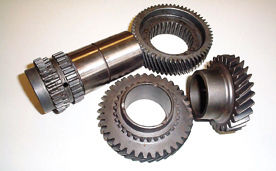Corus New Gear Steels Reduce Alloys Without Sacrificing Achievable Hardness

Corus Engineering Steels’ formula for its new gear steels: Maintain achievable hardness while using fewer alloys, thereby cutting steel costs for gear manufacturers.
Located in Rotherham, England, Corus Engineering Steels (CES) announced the new gear steels in July 2004.
"Lean alloy steels have been developed as a direct response to rising alloy prices," says James Hunt, market & product development manager for CES. "Lean alloys are by definition less costly than the higher alloy steels they replace."
As an example, Hunt says a leaner alloy steel, like an MnCr, could be as much as £182 ($327) per ton cheaper than a higher alloy steel, like an NiCrMo. The savings comes from differences in the base prices and alloy surcharges of the two steels.
"The biggest difference comes when we take into account the alloy surcharges," he says. "The prices for molybdenum and nickel are extremely unstable and very much higher than chromium."
CES develops its gear steels mainly for the automotive industry, supplying them to BMW, Eaton, Ford, General Motors, Scania, Volvo and ZF. CES’ new gear steels are, however, suitable for other industries, too.





